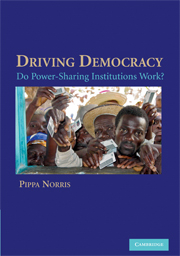Book contents
- Frontmatter
- Contents
- List of Tables
- List of Figures
- Preface and Acknowledgments
- PART I DO POWER-SHARING REGIMES WORK?
- 1 What Drives Democracy?
- 2 Evidence and Methods
- 3 Democratic Indicators and Trends
- 4 Wealth and Democracy
- PART II THE IMPACT OF POWER-SHARING INSTITUTIONS
- PART III CONCLUSIONS
- Technical Appendix: Description of the Variables and Data Sources
- Notes
- Select Bibliography
- Index
3 - Democratic Indicators and Trends
Published online by Cambridge University Press: 05 September 2012
- Frontmatter
- Contents
- List of Tables
- List of Figures
- Preface and Acknowledgments
- PART I DO POWER-SHARING REGIMES WORK?
- 1 What Drives Democracy?
- 2 Evidence and Methods
- 3 Democratic Indicators and Trends
- 4 Wealth and Democracy
- PART II THE IMPACT OF POWER-SHARING INSTITUTIONS
- PART III CONCLUSIONS
- Technical Appendix: Description of the Variables and Data Sources
- Notes
- Select Bibliography
- Index
Summary
Before proceeding to examine the evidence, the notion of democracy and the most appropriate measure of this concept need to be considered. In particular, what philosophical concepts of ‘democracy’ underline alternative empirical indicators? Is it best to adopt a minimalist approach toward measurement by selecting a few key indicators, or is it preferable to provide a more comprehensive set of benchmarks? When operationalizing the concept of democracy, should indicators be continuous, implying subtle gradations in levels of democratization? Or should they be categorical, suggesting that regimes cross a specific threshold, such as holding a competitive multiparty election, after which they can then be considered democratic? Should the evidence rest on observable regularities from ‘objective’ data, such as official levels of voter turnout, the frequency of national elections, or the number of parties contesting legislative seats? Or should such benchmarks be supplemented by subjective evaluations, exemplified by expert judgments used by Freedom House to evaluate conditions of political rights and civil liberties in each country, or the Polity IV project's coding of institutional restrictions on the executive? What are the major sources of random and nonrandom measurement error arising from these decisions that could potentially bias estimates of effects and generate misleading comparisons? What are the problems of missing data limiting these measures and how does this restrict the country coverage and comparative framework? What is the relationship between notions of democracy and of ‘good governance’, a concept which has become increasingly common in the developmental literature.
Information
- Type
- Chapter
- Information
- Driving DemocracyDo Power-Sharing Institutions Work?, pp. 54 - 78Publisher: Cambridge University PressPrint publication year: 2008
